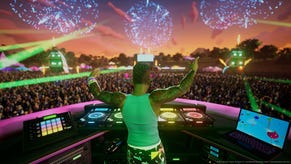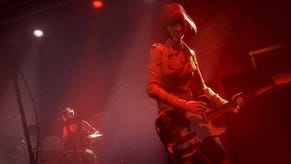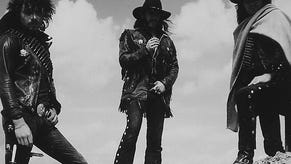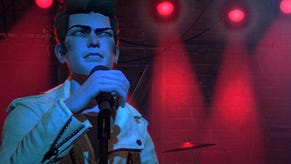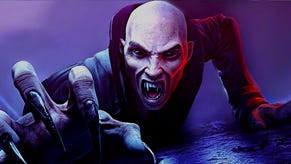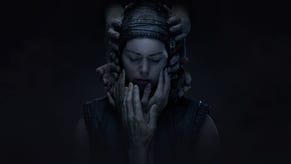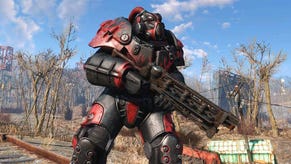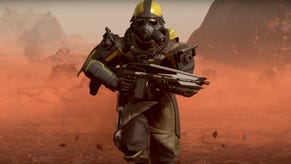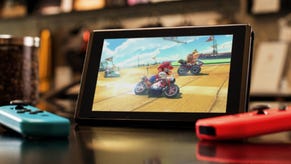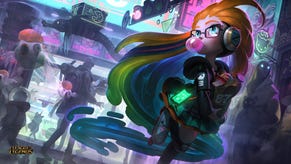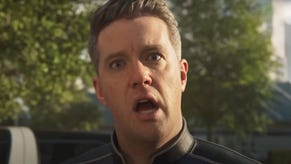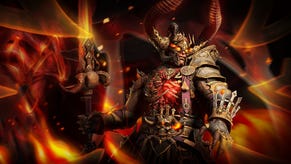Thank you for the music: The Rock Band Story
Rock Band has brought gamers together in the name of music since 2007. VG247's Dave Cook spoke with Harmonix devs Greg LoPiccolo and Daniel Sussman about the origin, evolution and future of the franchise.
Harmonix published its last Rock Band song DLC on April 2 this year. It was Don McLean's classic 'American Pie'.
The studio made clear it was the Rock Band store's swansong, but a huge question mark now hangs over the franchise. Will it return on next-gen formats, and if so what form will it take?
As a long-time fan of Harmonix - from the days of Frequency and Amplitude, right through Guitar Hero and the Rock Band trilogy - I wanted to know more.
I recently spoke with the studio's chief creative officer Greg LoPiccolo, and project director Daniel Sussman to discuss the birth of the series, the true extent of its cultural impact, and to get a clearer idea of what could happen next.
After all, the Rock Band franchise isn't just a series of games; it was a cultural phenomenon that took centre stage at parties and family gatherings, bringing many of us together in front of one console in an age currently obsessed with the idea of isolated online play.
It gave those without the talent, time or budget to form a real band an avenue to express themselves to songs that perhaps held a personal meaning, and it offered a colossal library of tracks that spoke to everyone's personal taste in different ways.
Rock Band was an open invitation party that asked very little of the player, but it gave so much in return. Players could rekindle friendships over the closing crescendo of Queen's 'Bohemian Rhapsody', or get fired up before a boozy night out to Tom Morello's riffage on Rage Against The Machine's 'Testify'. It was fun, pure and simple.
Guitar Hero and the MTV sale
LoPiccolo explained that the Rock Band concept was borne from humble beginnings. Contracted by now-defunct electronics company Red Octane, Harmonix was commissioned to develop a guitar simulator concept, and created a note track mechanic that bore similarities to the UI of its previous game Amplitude. The team eventually dubbed its project 'Guitar Hero'.
"We started with a couple of test songs that Eric Brosius [Guitar Hero audio lead, now Audio Director] worked up," LoPiccolo recalled, "and we had a very simple UI where 2D line segments representing notes dropped to intersect with a line across the bottom. We knew we wanted 5 buttons pretty early on, so that we’d cover all four fingers with fret positions, and we could force a hand position shift for expert players.
"All the second order stuff; chords, sustain and so on fell pretty naturally out of that initial crude interface. For the guitar controller, we had list of requests that we made to Red Octane, and they ran with it, and pretty much gave us everything we needed. We were very focused on the button and strum bar feel, so we had to iterate on those features, but it came together pretty smoothly."
Sussman added, "The fact that we were doing all of that while we were working with in-progress guitar designs made it all the more difficult. The hardware design was a whole different saga. At the time, Red Octane was our publisher and they were primarily known as developer of premium video game controllers.
"They were very open to ideas we had about the overall form, and function, of the controller. I believe our art director Ryan Lesser suggested the classic SG shape. We also suggested that the guitar have a whammy bar well before we knew what we'd do with it."
Guitar Hero launched on PS2 in November 2005 and currently holds a Metacritic rating of 91, compiling 47 tracks onto one disc that spanned generations of rock. It was a big hit that delivered a fresh control method and served as a fun way to play together with friends.
Work began on Guitar Hero 2 under new publisher Activision, which had acquired Red Octane in June 2006, while Harmonix itself was purchased by MTV Networks in September that year. Just as the studio left the booming franchise it had spawned, the game launched across North America on November 7, 2006 and went on to sell over 3 million copies in its life-span.
Although Harmonix had to walk away from Guitar Hero just as it was enjoying an incredible degree of success, its strong sales validated the appeal of the music peripheral format, and so the studio soldiered on and started to conceptualise something new and potentially revolutionary.
Get ready to rock and/or roll
"Once Activision purchased Red Octane, they owned the Guitar Hero brand," Sussman explained. "We were never able to work out a deal with Activision to continue to develop Guitar Hero and in fact, we wanted to push the boundaries of Guitar Hero way beyond guitar. So the Rock Band franchise was born."
The Guitar Hero concept was expanded to include drums, bass and vocal tracks that all played out in unison, allowing four people to work together simultaneously. Over time the Rock Band formula started to take shape, and it bore a more realistic visual style, sophisticated UI and robust, technically complicated peripherals that were both accurate and fun to use.
Sussman added that creating the controllers was hardly a walk in the park. "Some day I'll write a book about my experiences developing hardware for Rock Band," he said. "It was an extraordinary experience across the board.
"Each controller has hundreds of parts, the assemblies are delicate and complicated, the testing process was its own feat of creative engineering – there was so much that could go wrong. I still get chills when I see hardware in stores, or people's homes, and think about the journey that those little guitars and drums made."
But when it came to crafting the game's actual songs, Harmonix had the process down to something of a fine art, and Sussman was more than happy to explain the steps from start to finish. "The process behind Rock Band song authoring has evolved quite a bit over the lifespan of the franchise. At this point, it's pretty sophisticated, and there are quite a few factors that go into choosing each track."
Identifying what songs the team wanted to include on disc and as part of the game's weekly DLC updates boiled down to several factors. The first factor was personal taste, meaning that any songs the developers themselves wanted to play in Rock Band were up for consideration. There had to be a good mix of tracks released each week, so changing up genres between packs was a key factor.
Finally, the studio's constant dialogue with record labels helped Harmonix pick out songs from bands that were perhaps on tour, what artists they wanted to highlight, or songs that tied in to recent album releases.
Sussman continued, "Once we settle on a song, it generally takes a couple of weeks to get the multi-track masters mixed, bounced out and sent to us. That's when we start the authoring process. The bulk of authoring is done by the note authoring team, though there is also lip sync for vocals, and also camera and lights scripting that needs to be done by an artist.
"It is really quite a collaborative effort. We're also constantly testing to make sure that the authoring team is getting early feedback, not just on bugs, but on the quality of the feedback. The final part of the process is a final rigorous testing routine where each track is combed over at each difficulty."
It's a creative process that began before Rock Band launched in November of 2007, and ended when the DLC store came to a close on April 9, 2013. At the time of its closure the Rock Band store featured over 1,500 tracks that had been collectively downloaded over 100 million times, and that's not including the hundreds of songs submitted independently on Rock Band Network.
The day the music died.
Rock Band Network is particularly interesting, as it gave artists the opportunity to create their own note tracks and submit songs independently to the swelling Harmonix DLC store. It gave rise to a more diverse range of artists, encompassing bands from heavier genres such as iwrestledabearonce, Norma Jean and Emmure.
"I candidly can’t quite remember how it got traction," LoPiccolo explained. "Certainly we were getting inundated with requests from a lot of indie bands and their fans to include music that we were never going to get to, and we found the whole idea of crowd-sourcing content to be in line with our values and priorities as a developer. It ended up being a very complex and difficult system to develop, but it worked.
"We had no idea what kind of uptake we would get, and the response has been super gratifying. We now have more Rock Band Network songs in the library than we do Harmonix-authored songs. It is not particularly easy to make songs as you really have to learn a whole new skill, and there are tons of details that need to be attended to, which makes it all the more impressive how many people learned the tools and created songs."
Sussman added, "It was a very ambitious project on both the game integration front, in that we had to figure out all kinds of back end server solutions, legal issues as well as making sure we weren't crossing any policy concerns of the various first party companies - Microsoft, Sony and Nintendo.
"This also applied on the authoring tools front, as we were basically putting together a music editing suite that players could use to author the note charts, the lighting cues, and other song metadata. We also had to create and nurture a community of people to get behind the idea, as it would only be successful if people used it."
Rock Band Network can certainly be considered a success, but at the time of writing Harmonix has stopped accepted submissions from artists, and together with the closure of the Rock Band DLC store, it shrouds the future of the franchise in uncertainty,
I asked LoPiccolo why Harmonix decided to call time on Rock Band DLC, and if he or anyone at the studio had any plans for its eventual return. "We have every intention to return to Rock Band," he replied, "and we expect that the next-gen consoles that are being unveiled will give us all sorts of new creative possibilities to pursue. But we are currently super busy with lots of other creative initiatives, some of which you’ll be hearing about soon.
"I don’t know that we have any special insight about why those games got so huge so fast, or why they declined when they did. We just make them. But we do believe that Rock Band play remains one of the premier multiplayer game experiences on the planet, and we expect it to appeal to future generations of gamers as they discover it."
"There is a lot more we would like to do with the franchise, and we look forward to getting back into development when the time is right."
Time of your life
If there's one thing to take away from Rock Band's legacy then - again - it must surely be its cultural impact. From South Park's hilarious parody of Eric Cartman singing Lady Gaga's 'Poker Face', to spawning the idea of the 'Rock Band party', you'd be hard-pressed to find many gamers who haven't yet had a brush with the plastic delights of the franchise.
One topic that was often debated at the peak of the Guitar Hero and Rock Band craze was the impact it was having on the musical arts. Some bands and artists slammed both franchises for merely simulating instrumental talent, and suggested that they were stopping youngsters from picking up a real guitar. I asked LoPiccolo and Sussman for their thoughts on the matter.
"We have heard many stories about kids who started with Guitar Hero or Rock Band and were inspired to go on to develop actual instrumental skills," LoPiccolo replied, "so it clearly had that effect on a lot of players. The drums in particular can teach you some drumming skills that are then transferrable to an actual kit. But we also learned that not everyone wants to become a musician; some folks just want to get together with their friends and have some musical fun, and that is also OK."
Sussman added, "I love video games and think that they can play positive roles in peoples' lives. In particular, I think that games that focus on cultural or artistic elements can often expose people to new things. One of my favorite Guitar Hero stories had to do with a friend of mine's daughter hearing The Ramones for the first time.
"We always understood that we were making a game, even when we were designing the Rock Band Pro feature for Rock Band 3. The idea that some percentage of people would then extend the experience to something genuinely musical was always a kind of bonus for us. I find it inspirational when we hear stories of Rock Band players who traded their plastic instruments for real ones."
It's been a wild, inspirational ride for Harmonix as well, a ride that has seen them meet their musical idols, tinker with instruments and songs they grew up listening to, only to then see the series explode worldwide. LoPiccolo offered me a personal anecdote to close our discussion, and to sum up what he felt was his proudest moment working on the franchise.
"Somewhere in the middle of development of The Beatles: Rock Band, Yoko Ono came to visit us in Cambridge to review our progress. She had a lot to say. John wasn’t yet in his final form in terms of modelling or animation, and she wasn’t shy about describing the standard that she wanted us to hit. All her feedback was spot on, so we worked very hard to meet her expectations, and we did. She then let us know that we had, and that was really meaningful and rewarding.
When we got the final animation work back from Passion Pictures - they did the intro and outro cinematics for The Beatles: Rock Band - we got to see how the game would end, with giant flowers blooming over London. It was very emotional to see their whole career arc end so gracefully in the context of the game that we worked so hard on".
He then read out the some lines of Beatle's classic 'The End', as featured in the game's superbly-animated outro, 'And in the end, the love you take Is equal to the love you make', and added, "Which is ultimately how we have always felt about Rock Band as well. Seriously."
Are you a fan of Rock Band? Are you sad to see the DLC store come to a close? How would you like to see the franchise return moving forward? Feel free to share your fond memories of the series with us below.










